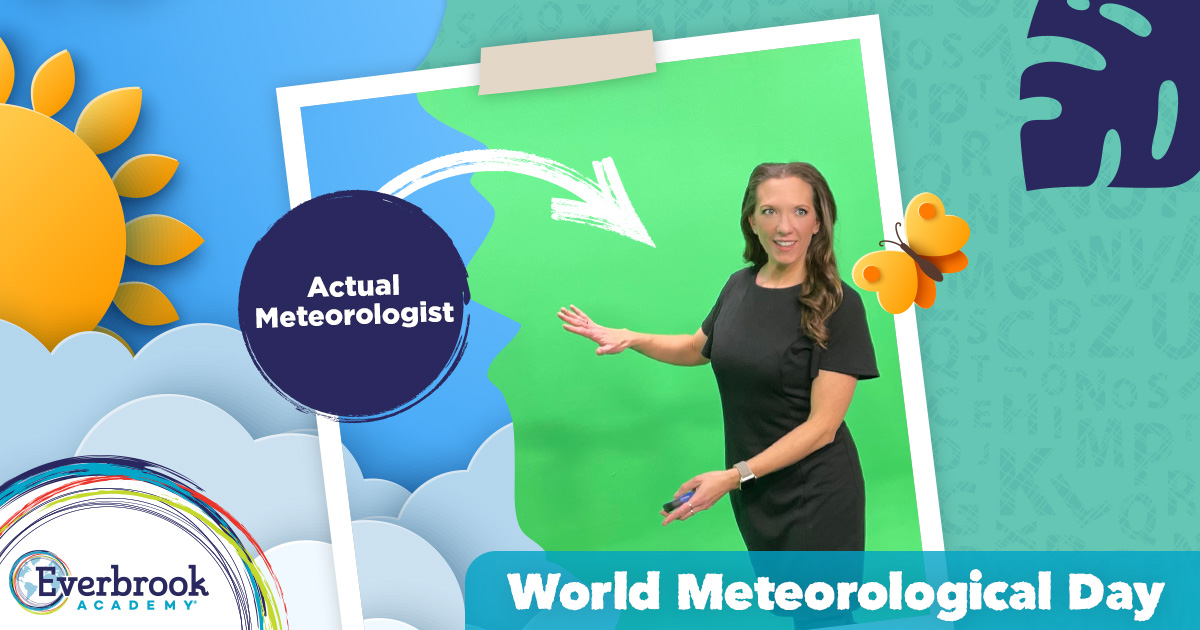- 855.437.3254
- Schedule a Tour
 World Meteorological Day is celebrated on March 23, each year. It’s the day the World Meteorological Organization (WMO) was formed in 1950. The WMO is a specialized agency of the United Nations dedicated to providing expertise about weather and climate analysis and its impact on our land and oceans.
World Meteorological Day is celebrated on March 23, each year. It’s the day the World Meteorological Organization (WMO) was formed in 1950. The WMO is a specialized agency of the United Nations dedicated to providing expertise about weather and climate analysis and its impact on our land and oceans.
To mark the occasion, we’re sharing insight from Christina Burkhart, an experienced meteorologist for ABC12 in Flint, Michigan, about making forecast predictions on television, her love of science, and what inspired her to become an expert in the field.
First, what does your role as a meteorologist entail?
I am the morning meteorologist for our TV station, which means I get up at 1:45 a.m. to get ready for work. After arriving, I look through different computer models, read through the forecast discussion from the National Weather Service, and look at the forecast used by the last meteorologist on shift. Once I put together my forecast, I’ll build the graphics, then get myself ready. I’m on air from 4:30 to 10:00 a.m. I also make sure our website and partner radio stations are updated and respond to any emails or help in the newsroom. If there are big snowstorms or severe weather, I stay late or come back in to help the weather team. I usually go to bed around 6:00 p.m. People often ask how I go to bed so early—trust me, when your body is tired from working overnight, it’s not hard to fall asleep!
What type of experience or special training was needed?
To be a meteorologist you must have a degree in meteorology. I have a Bachelor of Science in Earth Science and a Master of Science in Geosciences with a concentration in Meteorology. I took broadcast meteorology courses, went storm chasing in the Great Plains, taught earth science, and completed an optional thesis on mallard migration and climate change. I think all these things helped me to become more well-rounded and taught me how to better communicate science-related topics. I feel like there’s always learning to be done, always areas to improve, and my goal is to keep getting better every day.
It’s about so much more than being on TV and talking about how hot or cold it will be. It’s about safety and people’s livelihoods. Explain the true impact of meteorology.
This is so true! Siri and Alexa can tell you the current outdoor temperature, and apps will pop up notifications when it’s going to rain. But the vast majority of people like learning about the science of weather! Apps can’t explain that day-to-day information and they definitely can’t break down severe weather for you. When there is a storm that could be dangerous, it’s important to know exactly where that storm is currently located, where it’s going next, and what the threats are with that storm. All meteorologists like to watch their TV shows without interruptions too! So, remember when we break into regular programming for severe weather in your community, it’s solely to keep people safe. We are required by the FCC to be live on air as long as there is a tornado warning in our viewing area. We also continue to repeat information for those that may just be tuning in.
What has been your most memorable day on the job?
It was February 13, 2014. I was working in Traverse City, Michigan. Winter and ice caves had formed on Lake Michigan near Leelanau County. I strapped on ice cleats and hiked out onto Lake Michigan. It was quite a trek to get to the caves while lugging all of my TV gear, but it was an absolutely incredible experience! The caves were huge and beautiful! My story ended up being shown across the country! I’m really glad I could share this amazing natural weather phenomenon that occurred in my home state with so many people.
Everbrook Academy’s early education curriculum is based on STEAM learning. How do the elements of Science, Technology, Engineering, the Arts, and Math play into your job as a forecaster?
All of them play a role! Meteorology itself involves math, chemistry, physics, and statistics. But the arts are important too, from visualizing how the atmosphere is moving to creating graphics to show on TV. It can take a great deal of creativity to design a graphic that will be used to explain a certain element of weather.
What would you say to a child who might be fascinated by the science of weather?
Have fun learning all about it—watch weather videos, go to a science museum, or do some at-home weather experiments. You’ll figure out as you get older if the weather is something you like more as a hobby or something you’d like to do for your career. Meteorology courses can be really challenging just like classes in any other STEAM field, but you can do anything you set your mind to!
A big thanks to Christina Burkhart of ABC12 for sharing her heart and expertise with our Everbrook Academy families for World Meteorological Day. If you’d like to see more of Christina’s journey on TV and in the world of weather, follow her on Twitter or Facebook.
